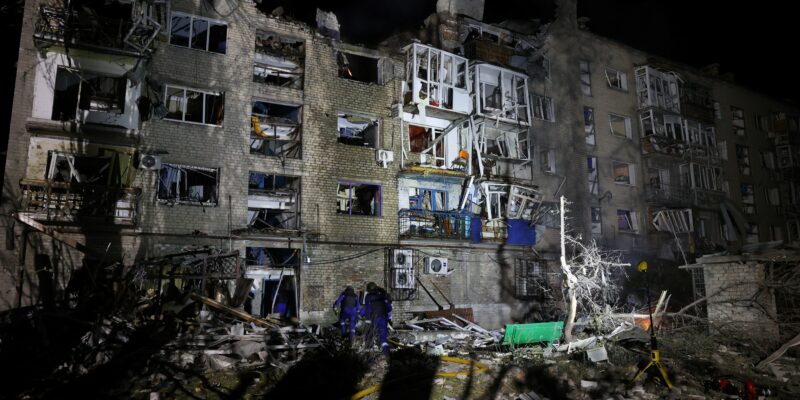Ukraine: Russian missiles repeatedly strike Donetsk journalists’ hotel

On 7 August, Russian missile strikes damaged a hotel, which is popular among journalists covering the war, in the city of Pokrovsk in the eastern Donetsk region, in Ukraine. It is the second time in recent weeks that facilities used by media workers have been hit by Russian fire in Ukrainian cities. The International and European Federations of Journalists (IFJ-EFJ) condemn the attack in the strongest terms and remind the Russian authorities that journalists and media workers operating in areas of armed conflict must be treated and protected as civilians and allowed to perform their work without interference.
Russian strikes destroyed a hotel and an apartment building in the eastern city of Pokrovsk on the night of 7 August, killing at least eight civilians, Reuters reported.
The Druzhba hotel, one of the few that was still operating in the region, which is close to the frontline, is known to be popular among correspondents covering the war. So far, no journalists have been reported wounded in the attack, according to the IFJ-EFJ affiliate in Ukraine, the National Union of Journalists of Ukraine (NUJU).
BBC’s correspondent in Ukraine, James Waterhouse, tweeted that his team stayed in the hotel in May to cover the war.
Two Russian missiles hit central Pokrovsk. We stayed at this hotel in May to report on the thousands returning to their homes close to the front line.
Five people killed & 31 injured. The risks are real and enduring. pic.twitter.com/aydlnOx9cZ
— James Waterhouse (@JamWaterhouse) August 7, 2023
It is the second time in recent weeks that facilities used by journalists have been hit in Russian strikes on Ukrainian cities. These follow an attack on June 27 on a pizza restaurant, frequented by journalists and aid workers, in the eastern city of Kramatorsk, according to The Guardian. In the strike, at least eleven people were killed, including award-winning Ukrainian writer Victoria Amelina.
“The Russian military is clearly targeting journalists and independent media workers. Every colleague who goes to work, not necessarily on the front lines but anywhere in the Donetsk region, shows great courage because at any moment, a Russian strike can destroy a hotel or a restaurant,” said the President of the National Union of Journalists of Ukraine (NUJU), Sergiy Tomilenko. “The killing of the well-known writer Victoria Amelina from serious injuries as a result of the shelling of a pizza restaurant in Kramatorsk is a war crime.The fate of Victoria illustrates the danger faced by journalists or any other individual covering the war. We urge world leaders to stop the Russian military and protect civilians.”
The IFJ Deputy General Secretary Tim Dawson said: “Modern missiles can be targeted to strike specific rooms within buildings. When places known to be frequented by journalists are repeatedly struck, the intention is clear – scare away the media so that atrocities go unreported. Our responsibility as journalists is to call out this shocking behaviour and shine light anew where the missiles fly.”
“We are convinced that war crimes committed by the Russian invader have put an end to the lives of several journalists in Ukraine,” added the EFJ General Secretary Ricardo Gutiérrez. “We welcome the efforts made by our Ukrainian affiliates to help the justice system identify the perpetrators of these crimes and convict them”.
The IFJ and the EFJ denounced the targeting of facilities frequented by journalists and media workers and reminded the Russian authorities of their obligations regarding the protection of journalists, in accordance with international humanitarian and human rights law, set out in the 1949 Geneva Convention on the Protection of Civilian Persons in Time of War, and cited in UN Security Council Resolution 2222.
Fourteen journalists and media workers have been killed on duty since Russia invaded Ukraine on February 24, 2022, according to IFJ data.






